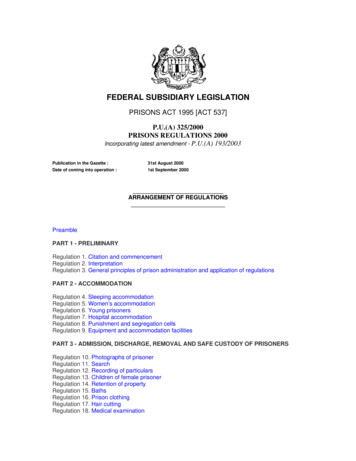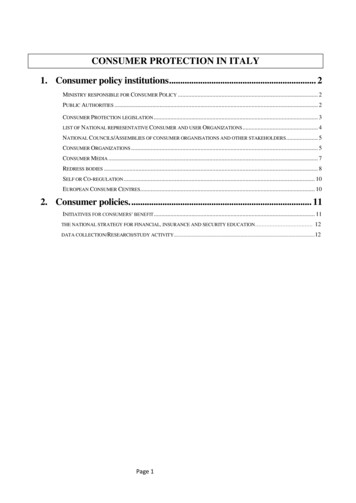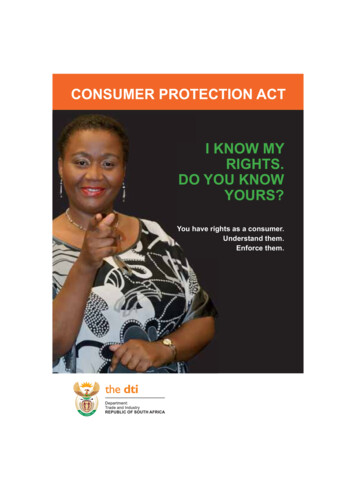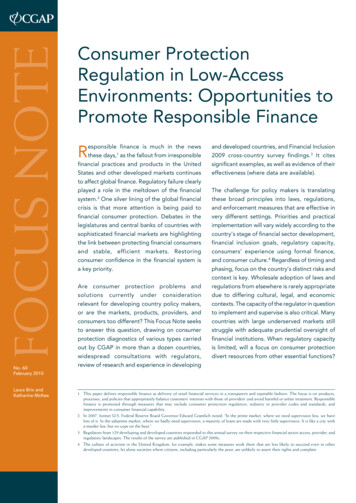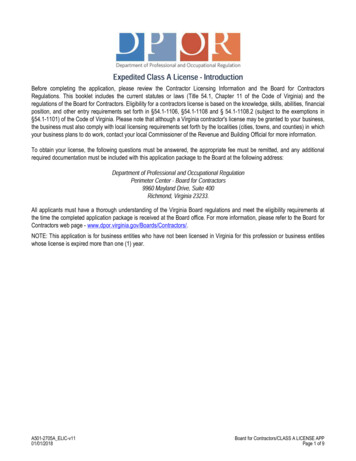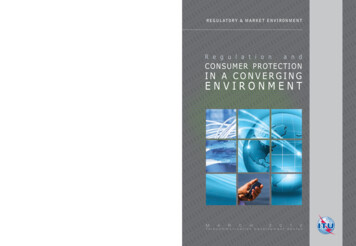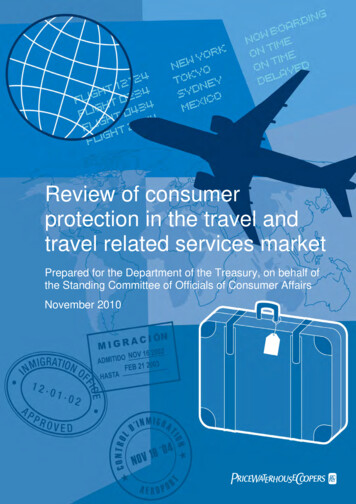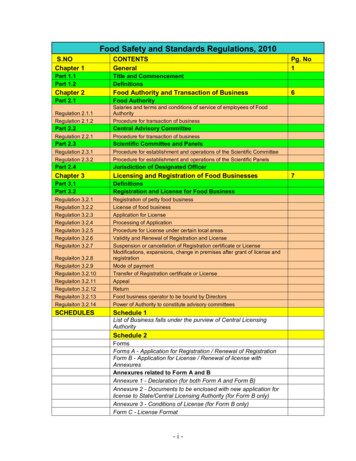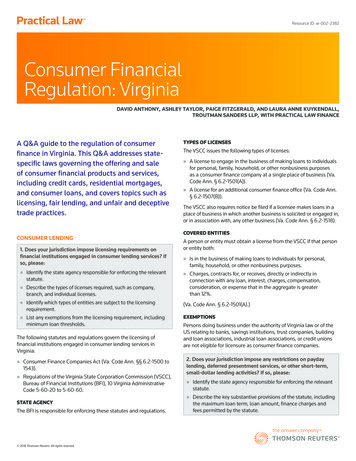
Transcription
Resource ID: w-002-2382Consumer FinancialRegulation: VirginiaDAVID ANTHONY, ASHLEY TAYLOR, PAIGE FITZGERALD, AND LAURA ANNE KUYKENDALL,TROUTMAN SANDERS LLP, WITH PRACTICAL LAW FINANCEA Q&A guide to the regulation of consumerfinance in Virginia. This Q&A addresses statespecific laws governing the offering and saleof consumer financial products and services,including credit cards, residential mortgages,and consumer loans, and covers topics such aslicensing, fair lending, and unfair and deceptivetrade practices.CONSUMER LENDING1. Does your jurisdiction impose licensing requirements onfinancial institutions engaged in consumer lending services? Ifso, please: Identify the state agency responsible for enforcing the relevantstatute. Describe the types of licenses required, such as company,branch, and individual licenses. Identify which types of entities are subject to the licensingrequirement. List any exemptions from the licensing requirement, includingminimum loan thresholds.The following statutes and regulations govern the licensing offinancial institutions engaged in consumer lending services inVirginia: Consumer Finance Companies Act (Va. Code Ann. §§ 6.2-1500 to1543). Regulations of the Virginia State Corporation Commission (VSCC),Bureau of Financial Institutions (BFI), 10 Virginia AdministrativeCode 5-60-20 to 5-60-60.STATE AGENCYThe BFI is responsible for enforcing these statutes and regulations. 2016 Thomson Reuters. All rights reserved.TYPES OF LICENSESThe VSCC issues the following types of licenses: A license to engage in the business of making loans to individualsfor personal, family, household, or other nonbusiness purposesas a consumer finance company at a single place of business (Va.Code Ann. § 6.2-1501(A)). A license for an additional consumer finance office (Va. Code Ann.§ 6.2-1507(B)).The VSCC also requires notice be filed if a licensee makes loans in aplace of business in which another business is solicited or engaged in,or in association with, any other business (Va. Code Ann. § 6.2-1518).COVERED ENTITIESA person or entity must obtain a license from the VSCC if that personor entity both: Is in the business of making loans to individuals for personal,family, household, or other nonbusiness purposes. Charges, contracts for, or receives, directly or indirectly inconnection with any loan, interest, charges, compensation,consideration, or expense that in the aggregate is greaterthan 12%.(Va. Code Ann. § 6.2-1501(A).)EXEMPTIONSPersons doing business under the authority of Virginia law or of theUS relating to banks, savings institutions, trust companies, buildingand loan associations, industrial loan associations, or credit unionsare not eligible for licensure as consumer finance companies.2. Does your jurisdiction impose any restrictions on paydaylending, deferred presentment services, or other short-term,small-dollar lending activities? If so, please: Identify the state agency responsible for enforcing the relevantstatute. Describe the key substantive provisions of the statute, includingthe maximum loan term, loan amount, finance charges andfees permitted by the statute.
Consumer Financial Regulation: VirginiaThe following statutes and regulations govern payday lending inVirginia: Payday Lenders Act (Va. Code Ann. §§ 6.2-1800 to 6.2-1829). Regulations of the Virginia State Corporation Commission's(VSCC) Bureau of Financial Institutions (BFI), 10 VirginiaAdministrative Code 5-200-10 to 5-200-130.STATE AGENCYThe BFI is responsible for enforcing the statutes and regulations.KEY SUBSTANTIVE PROVISIONSA payday loan is defined as a small, short-maturity loan on thesecurity of:FOREIGN LANGUAGE DISCLOSURES3. Must financial institutions provide disclosures in a languageother than English to consumers engaged in credit transactions?If so, please: Define the relevant statute's key terms. Explain which types of credit transactions are subject to thedisclosure requirement. List any exemptions to the foreign language disclosurerequirement.Virginia does not require financial institutions to provide disclosuresin a language other than English to consumers engaged in credittransactions. A check. An assignment of interest in an individual's account at adepository institution. An assignment of income payable to an individual, other thanloans based on income tax refunds.FAIR LENDING4. Does your jurisdiction have a fair lending, human rights, civilrights, or comparable anti-discrimination statute that appliesto lending or other credit transactions? If so, please:(Va. Code Ann. § 6.2-1800.) Identify the state agency responsible for enforcing the statute.The key provisions governing payday lending include: Describe the statute's key substantive provisions, including the A payday lender must obtain a license to engage in paydaylending to any consumer residing in Virginia (Va. Code Ann.§ 6.2-1801(a)). A payday loan must:be in writing;zzbe signed by the borrower and the person authorized by thelicense to sign the dated agreement; andzzstate the principal amount of the loan, interest, and any feecharged.zz(Va. Code Ann. § 6.2-1816(1).) The maximum principal loan amount is 500 (Va. Code Ann.§ 6.2-1816(5)). The interest rate for payday loans are capped at 36% (Va. CodeAnn. § 6.2-1817(A)). The minimum loan term is two times the borrower's pay cycle(Va. Code Ann. § 6.2-1816(1)). A payday lender must provide the borrower with a pamphletexplaining in plain language the rights and responsibilitiesof the borrower and a clear and conspicuous notice that apayday loan is intended for short-term cash needs (Va. Code Ann.§ 6.2-1816(15), (16)). A payday lender must comply with the federal Fair Debt CollectionPractices Act (15 U.S.C. § 1692 to 1692p) in collecting a paydayloan (Va. Code Ann. § 6.2-1816(22)).2prohibited bases of discrimination. Describe the penalties for statutory violations. Describe any significant differences between the statute andany relevant federal law.The following statutes and regulations govern anti-discriminatorypractices in credit transactions in Virginia: Equal Credit Opportunities Act (ECOA) (Va. Code Ann. §§ 6.2-500to 6.2-513). Regulation of the Virginia State Corporation Commission, Bureauof Financial Institutions (BFI), 10 Virginia Administrative Code5-180-10.STATE AGENCYThe BFI enforces these statutes. The Virginia Attorney General mayalso enforce this statute by bringing an action in the name of theCommonwealth. (Va. Code Ann. § 6.2-513.)KEY TERMSKey provisions include the following: The ECOA applies to any person applying to a creditor for anextension, renewal, or continuation of credit (Va. Code Ann.§ 6.2-500). A creditor is prohibited from discriminating against any applicantregarding any aspect of a credit transaction based on race, color, 2016 Thomson Reuters. All rights reserved.
Consumer Financial Regulation: Virginiareligion, national origin, sex, marital status, age, or an applicant'spublic-assistance derived income (Va. Code Ann. § 6.2-501; seeProhibited Bases of Discrimination). A creditor must notify a loan applicant of an action on a creditapplication within 30 days after receiving a completed creditapplication (Va. Code Ann. § 6.2-502). A creditor must provide a statement to the applicant containingthe reason for the adverse action taken on the application (Va.Code Ann. § 6.2-503). Any action to remedy a violation of the ECOA must be broughtwithin two years from the date of the occurrence of the violation(Va. Code Ann. § 6.2-505(E)). Liability is not incurred when an act is done or omitted in goodfaith in conformity with any rule, regulation, or interpretation bythe VSCC or Federal Reserve Board (Va. Code Ann. § 6.2-507). If an act or omission constitutes a violation of the ECOA andfederal law, an individual may bring an action to recover monetarydamages under either state or federal law. This election does notapply to administrative actions or court actions in which monetarydamages are not sought (Va. Code Ann. § 6.2-512).PENALTIES FOR STATUTORY VIOLATIONSA creditor may be liable to an aggrieved applicant for actualdamages, punitive damages up to 10,000, and attorneys' fees (Va.Code Ann. § 6.2-505(A), (B), (D)). A court may also impose equitableand declaratory relief (Va. Code Ann. § 6.2-505(C)).SIGNIFICANT DIFFERENCES FROM FEDERAL LAWCompliance with the federal Equal Credit Opportunity Act (15 U.S.C.§§ 1691 to 1691f) constitutes compliance with the ECOA (Va. CodeAnn. § 6.2-508). The federal act additionally provides that a personmay not discriminate against an applicant who has in good faithexercised any right under the federal act (15 U.S.C. § 1691(a)(3)).INTEREST RATE AND FEE LIMITATIONS5. Does your jurisdiction impose restrictions on the maximuminterest rate that may be charged on a loan? If so, please: Identify the state agency responsible for enforcing the relevantstatute. Describe the key substantive provisions of the statute, includingthe types of loans subject to the restrictions.PROHIBITED BASES OF DISCRIMINATION Identify any exemptions from the restrictions.A creditor is prohibited from discriminating against any applicant,regarding any aspect of a credit transaction, on any of the followingbases: Describe any significant differences between the statute and Race. Color.any federal law.Virginia law imposes restrictions on maximum interest rates that maybe charged on a loan (Va. Code Ann. § 6.2-303). Religion.STATE AGENCY National origin.The Virginia State Corporation Commission's, Bureau of FinancialInstitutions enforces the statutes governing loan interest rates. Sex or marital status. Age, assuming the applicant has the capacity to contract. All or part of the applicant's income deriving from any publicassistance or social services program.(Va. Code Ann. § 6.2-501(A).)A creditor may: Make an inquiry of marital status to determine the creditor's rightsand remedies applicable to the extension of credit and not todiscriminate in a determination of creditworthiness Make an inquiry of the applicant's age or whether the applicant'sincome derives from any public assistance or social servicesprogram to determine the amount and probable continuanceof income levels, credit history, or other relevant element ofcreditworthiness. Use any empirically derived credit system, which considers age, ifthe system is demonstrably and statistically sound in accordancewith regulations of the VSCC, except the age of an elderlyapplicant may not be assigned a negative factor or value. Make an inquiry or consider the age of an elderly applicant when itis used by the creditor to extend credit in favor of the applicant.(Va. Code Ann. § 6.2-501(B).) 2016 Thomson Reuters. All rights reserved.KEY TERMS AND COVERED LOANSUnless there is an exception, the interest rate on a loan cannotexceed 12% per year (Va. Code Ann. § 6.2-303(A); see Exemptions).Penalties include recovery of all of the following: The total amount of interest paid in excess of that permitted bythe applicable statute. Twice the total amount of interest paid during the two yearsimmediately preceding the filing date of the action. Court costs and attorneys' fees.(Va. Code Ann. § 6.2-305(A)(1) to (3).)EXEMPTIONSExceptions include: A bank or savings institution making a loan payable ininstallments may impose finance charges and other charges andfees at rates and in amounts agreed to by the borrower (Va. CodeAnn. § 6.2-309). A state bank or savings institution may take, receive, reserve, andcharge on a loan any rate of interest, finance charge, or other loancharge permitted to any other lender under Virginia law (Va. CodeAnn. § 6.2-310).3
Consumer Financial Regulation: Virginia A consumer finance company may charge and receive a singleannual interest rate of up to 36% on a loan of up to 2,500 (Va.Code Ann. § 6.2-1520(A)(1)). A payday lender may charge an amount up to 36% (Va. Code Ann.§ 6.2-1817(A)). A motor vehicle title lender may charge and collect maximuminterest of up to:22% per month on a principal amount up to 700;zz18% per month on a principal amount that is between 700 and 1400; andzz15% per month on a principal amount exceeding 1,400.zz(Va. Code Ann. § 6.2-2216(A).)(Va. Code Ann. § 6.2-303(B).)SIGNIFICANT DIFFERENCES FROM FEDERAL LAWFederal law does not impose a general interest rate limitation onloans. However, certain federal regulations may cap interest rates onparticular types of loans. For example, the Federal Credit Union Actmandates that federal credit union loans may not exceed an interestrate of 15% per year (12 U.S.C. § 1757(5)(A)(vi)).6. Does your jurisdiction limit the maximum finance charge thatmay be charged on a loan? If so, please: Identify the state agency responsible for enforcing the relevantstatute. Define the relevant statute's key terms. Identify the types of loans subject to the statute. List any statutory exemptions. Describe any significant differences between the statute andany relevant federal law.The following statutes specify limitations on the maximum financecharge that may be charged on certain credit sales in Virginia: Section 6.2-311 of the Virginia Code (closed-end installment loans). Section 6.2-312 of the Virginia Code (open-end credit plans).STATE AGENCYThe Virginia State Corporation Commission's (VSCC), Bureau ofFinancial Institutions is responsible for enforcing statutes regardingfinance charges.KEY TERMS AND COVERED LOANSFor a closed-end installment credit plan or arrangement, key termsinclude the following: Any seller of goods or services who extends credit may imposefinance charges at a rate agreed to by the seller and purchaser.Deferrals and extensions of the time for payment, if allowed bya seller of goods or services or his assignee, may be subject toa finance charge if agreed to in the original contract or at thetime of the renewal or extension. No additional finance chargecan be made for an extension of credit under this type of planor arrangement. If the total finance charge on the transactionis precomputed according to the actuarial method, the finance4charge must be calculated on the assumption that all scheduledpayments will be made when due. The debtor has the right to prepay in full on precomputedtransactions and receive a rebate of the unearned finance chargedetermined in accordance with the Rule of 78, or other methodelected by the seller if this method does not exceed the amountthat results from the Rule of 78 on extensions of credit with aninitial maturity of 61 months or less. For extensions of credit with aninitial maturity of more than 61 months, the debtor receives a rebatecomputed under a method at least as favorable to the debtor asthe actuarial method. The seller may also condition this rebate onreceiving a minimum of 25 in finance charges. This amount, to theextent not earned, may be withheld from the rebate required.(Va. Code Ann. § 6.2-311.)Under an open-end credit plan, a seller or lender extending creditmay impose on credit extended under the plan, finance chargesand other charges and fees at the rates as agreed to by the creditorand the obligor. Under the plan, a finance charge is imposed on theobligor if the unpaid balance is not paid in full prior to the next billingdate, which must be at least 25 days later than the prior billing date.(Va. Code Ann. § 6.2-312.)EXEMPTIONSA bank or savings institution making a loan payable in installments,an open end credit plan, or a loan payable in installments to financethe purchase of a motor vehicle may impose finance charges andother charges and fees at the rates and in the amounts and manneragreed to by the borrower (Va. Code Ann. §§ 6.2-309, 6.2-310,6.2-313, and 6.2-314).A credit union engaged in extending credit under an open-end creditplan may impose finance charges and other charges and fees atthe rates and in the amounts and manner as agreed to by the creditunion and the obligor if a finance charge is imposed on the obligorunder the plan (Va. Code Ann. § 6.2-318).SIGNIFICANT DIFFERENCES FROM FEDERAL LAWFederal law does not impose a general limitation on the maximumfinance charges that may be charged on a loan.7. Does your jurisdiction limit the maximum amount of fees thatmay be charged on a loan? If so, please: Identify the state agency responsible for enforcing the relevantstatute. Define the relevant statute's key terms. Identify the types of loans subject to the statute. List any statutory exemptions. Describe any significant differences between the statute andany relevant federal law.The following statutes impose limitations on the maximum fees thatmay be charged on a loan in Virginia: Section 6.2-1520(B), (C) of the Virginia Code Annotated (consumerfinance companies). 2016 Thomson Reuters. All rights reserved.
Consumer Financial Regulation: Virginia Section 6.2-1817(B), (C) of the Virginia Code Annotated (paydaylending). Section 6.2-2216(D), (G) of the Virginia Code Annotated (motorvehicle title loans).STATE AGENCYThe Virginia State Corporation Commission's (VSCC), Bureau ofFinancial Institutions is responsible for enforcing statutes regardingloan fees.UNFAIR AND DECEPTIVE PRACTICES8. Does your jurisdiction prohibit financial institutions fromengaging in unfair, deceptive, or abusive acts or practices? Ifso, please: Identify the state agency responsible for enforcing the relevantstatute and describe any key agency guidance regarding thestatute. Define the relevant statute's key terms.KEY TERMS AND COVERED LOANS Describe the penalties for statutory violations.Key terms include: Describe any significant differences between the statute and Aconsumer finance company may impose a late charge ofup to 5% for borrower's failure to make a timely payment ofany installment due. The amount of the late charge must bespecified in the loan contract. A "timely payment" means apayment made by the date fixed for payment or within a periodof seven calendar days after the fixed date. (Va. Code Ann.§ 6.2-1520(B).) A consumer finance company may impose a processing fee. Thefee is deemed to constitute interest charged and cannot exceed35% of the annual interest rate for a loan amount of up to 2,500.(Va. Code Ann. § 6.2-1520(C).) Apayday lender may charge a loan fee of up to 20% of theamount of the loan proceeds advanced to the borrower anda verification fee not to exceed 5 (Va. Code Ann. § 6.21817(B), (C)). A borrower is not liable for fees incurred in connection with thestorage of a motor vehicle securing a title loan following thevehicle's repossession by the licensee or its agent, or the voluntarysurrender of possession of the vehicle by the borrower to thelicensee. A motor vehicle title lender may not charge, contract for,collect, receive, recover, or require a borrower to pay any other fee,charge, or amount except for:a licensee's actual cost of perfecting its security interest in amotor vehicle securing the borrower's obligations under a loanagreement; andzzreasonable costs of repossession and sale of the motorvehicle.zz(Va. Code Ann. § 6.2-2216(D).) A motor vehicle title lender may charge a late fee of up to 5% inany amount due under the loan agreement (Va. Code Ann. § 6.22216(G)).SIGNIFICANT DIFFERENCES FROM FEDERAL LAWFederal law does not impose a general limitation on the amount offees that may be charged on a loan. 2016 Thomson Reuters. All rights reserved.relevant federal law.The Virginia Consumer Protection Act (VCPA) (Va. Code Ann.§§ 59.1-196 to 59.1-207) prohibits certain fraudulent acts or practicescommitted by a supplier in connection with a consumer transaction.The VCPA expressly excludes banks, savings institutions, creditunions, small loan companies, and mortgage lenders, leaving onlya small part of the credit industry covered by the statute (Va. Code§ 59.1-199(D)).Additionally, Section 6.2-1524(B) of the Virginia Code prohibitsconsumer finance companies from advertising, displaying,distributing, or broadcasting, in any manner, any false, misleading,or deceptive statement or representation about the rates, terms, orconditions for loans made by consumer finance companies.STATE AGENCYThe Virginia Attorney General is responsible for enforcing the VCPA.The Virginia State Corporation Commission's (VSCC) Bureau ofFinancial Institutions is responsible for enforcing Section 6.2-1524(D)of the Virginia Code Annotated.KEY TERMSThe key provisions of the VCPA include: The statute applies to "suppliers," which is defined as a:seller, lessor, or licensor who advertises, solicits, or engages inconsumer transactions; orzzmanufacturer, distributor, or licensor who advertises and sells,leases, or licenses goods or services to be resold, leased, orsublicensed by others in consumer transactions.zz(Va. Code Ann. § 59.1-198.) A supplier is prohibited from committing fraudulent acts including,for example:using deception, fraud, false pretense, or misrepresentation inconnection with a consumer transaction;zz5
Consumer Financial Regulation: Virginiaviolating the Payday Lending Act and Debt Collection PracticesAct.zzDEBT COLLECTION(Va. Code Ann. § 59.1-200.)9. Does your jurisdiction have a statute governing debtcollection activities? If so, please:Additionally, Section 6.2-1524(B) of the Virginia Code specifies thatthe VSCC may: Identify the key agency responsible for enforcing the statute. Require that charges or rates of charge, if stated by a licensee, Describe any significant differences between the statute andbe specified fully and clearly in a manner it deems necessary toprevent misunderstanding by prospective borrowers. Permit or require licensees to refer in their advertising that theirbusiness is under state supervision or subject to conditionsimposed by the state to prevent false, misleading, or deceptiveimpression.PENALTIESUnder the VCPA, the Virginia Attorney General may bring an actionon behalf of the people of the Commonwealth to: Enjoin the unlawful acts or practices (Va. Code Ann. § 59.1-201.1). Obtain restitution of any moneys or property (real, personal, ormixed, tangible or intangible), which may have been acquired froma person by means of any unlawful act or practice (Va. Code Ann.§ 59.1-205).Additionally, any individual who suffers a loss may initiate an actionto recover the greater of actual damages, or 500. For willfulviolations, a court may increase the amount of recoverable damagesup to the greater of three times the actual damages sustained or 1,000. However, any person who accepts a cure offer under theVCPA may not initiate or maintain any action arising under anotherstatute or common law if that action is substantially based on thesame allegations of the VCPA action. Attorneys' fees and court costsmay be awarded in addition to damages. (Va. Code Ann. § 59.1204(A), (B).)An individual violating the statutes governing consumer financecompanies (Va. Code Ann. §§ 6.2-1500 to 6.2-1543), includinglicensing requirements, is guilty of a Class 2 misdemeanor (Va.Code Ann. § 6.2-1540). The VSCC may impose a civil penalty of upto 10,000 on any licensee who has violated these statutes eitherknowingly or without the exercise of due care to prevent the violation(Va. Code Ann. § 6.2-1543).SIGNIFICANT DIFFERENCES FROM FEDERAL LAWUnlike the VCPA, which excludes banks, savings institutions, creditunions, and mortgage lenders from its purview, Title X of the DoddFrank Wall Street Reform and Consumer Protection Act (12 U.S.C.§§ 5491 to 5603) does not exclude banks and financial institutionsfrom being subject to consumer financial regulations.Specifically, the Dodd-Frank Act created the Consumer FinancialProtection Bureau (CFPB) which supervises banks, credit unions, andother financial companies, and enforces federal consumer financiallaws. The Dodd-Frank Act also provided the CFPB with the authorityto supervise and examine many non-bank financial service providerspreviously unsupervised at the federal level, such as mortgagecompanies, payday lenders, private education lenders, larger debtcollectors, and consumer reporting companies.6 Describe the key substantive provision of the statute.any relevant federal law, including the Fair Debt CollectionPractices Act.Virginia does not have a general debt collection statute. However,Section 6.2-1816(22) of the Virginia Code requires that paydaylenders comply with the federal Fair Debt Collection Practices Act (15U.S.C. §§ 1692 to 1692p) regardless of whether the payday lender iscollecting the debt in its own name.10. Please describe any circumstances under which financialinstitutions or collection agencies in your jurisdiction areprohibited from collecting a debt from a consumer.In an action to collect debt from a consumer, a court cannot enterdefault judgment against a defendant who does not make anappearance if the defendant is in military service (Va. Code Ann.§ 8.01-15.2).11. Please describe any statute of limitations for collectingunpaid debts, including credit card debt.Generally, the statute of limitations for collecting unpaid debts whena written contract exists, including credit card debt, is five years (Va.Code Ann. § 8.01-246(2)). The statute of limitations for collectingunpaid debts regarding an unwritten contract is three years (Va. CodeAnn. § 8.01-246(4)). The five-year statute of limitations for writtencontracts also applies to credit card agreements that consist of aseries of documents if: At least one of the documents referencing and incorporating theother documents is signed by the cardholder. The documents contain all essential terms of the agreement.(See Opinion of Attorney General to The Honorable Bill Janis,Member, House of Delegates, 10-128.)The limitations period for notes is six years (Va. Code Ann. § 8.3A-118).GIFT CARDS AND PREPAID CARDS12. Does your jurisdiction impose any restrictions on theoffering of gifts cards, gift certificates, or other general-useprepaid cards? If so, please describe the key substantiveprovisions, including any provisions governing expiration dates,fees, or disclosures.Virginia law imposes restrictions on the offering of gifts cards, giftcertificates, or other general-use prepaid cards (Va. Code Ann.§§ 59.1-530 to 59.1-532). Additionally, Virginia's unclaimed propertylaws address gift certificates and credit balances (Va. Code Ann.§ 55-210.8:1). 2016 Thomson Reuters. All rights reserved.
Consumer Financial Regulation: VirginiaA "gift certificate" is defined as a certificate, electronic card, or othermedium that evidences the giving of consideration in exchange forthe right to redeem the certificate, electronic card, or other mediumfor goods, food, services, credit, or money of an equal value. A"credit balance" is defined as intangible property resulting fromor attributable to the sale of goods or services, which includes, forexample, an overpayment, credit memo, refund, discount, rebate,unidentified remittance, or deposit. (Va. Code Ann. § 55-210.2.)Key provisions include: Each gift certificate issued that has an expiration date mustinclude either a written statement of the expiration date ora telephone number or address where the holder can obtainexpiration information (Va. Code Ann. § 59.1-531(A)). Each gift certificate that diminishes in value over time mustinclude a telephone number or address where the holder mayobtain this information (Va. Code Ann. §59.1-531(B)). A violation of this statute is a prohibited practice underSection 59.1-200 of the Virginia Consumer Protection Act and issubject to enforcement provisions, including individual actions fordamages (Va. Code Ann. § 59.1-204) and actions by the AttorneyGeneral for civil penalties (Va. Code Ann. § 59.1-206) (Va. CodeAnn. § 59.1-532).ANCILLARY CREDIT PRODUCTS13. Does your jurisdiction regulate any ancillary credit productsoffered by financial institutions, such as debt cancellation orguaranteed asset protection, as insurance products? If so,please: Identify the state agency responsible for regulation of thesecredit products. Describe the key substantive provisions of the relevantregulation.The following statutes govern certain ancillary credit products offeredby financial institutions as insurance products in Virginia: Sections 38.2-3717 to 38.2-3738 of the Virginia Code (creditinsurance). Sections 38.2-1800 to 38.2-1813 of the Virginia Code (licensing oflimited line credit insurance agents). Regulations of the Virginia State Corporation Commission (VSCC),Bureau of Insurance (BOI), 14 Virginia Administrative Code 5-10010 to 5-100-80.STATE AGENCYThe VSCC's BOI is responsible for administering laws relating tocredit insurance.KEY SUBSTANTIVE PROVISIONSThe key provisions of Virginia law relating to ancillary credit productsinclude: A person who sells, solicits, or negotiates individual or grouppolicies of credit life insurance must obtain a license as a life andannuities insurance agent or limited lines credit insurance agent. 2016 Thomson Reuters. All rights reserved. A person who sells, solicits, or negotiates individual or grouppolicies of credit accident and sickness insurance must be licensedas either a health agent or a limited lines credit insurance agent(Va. Code Ann. § 38.2-3734). If an indebtedness is repayable in substantially equal installments,the amount of credit life insurance must not exceed the actualamount of unpaid indebtedness (Va. Code Ann. § 38.2-3720(A)(1)). The amount of credit life insurance on an indebtedness of anydebtor cannot exceed 70,000 with any one insurance company(Va. Code Ann. § 38.2-3720(D)). Any person who willfully violates these statutes will be punishedfor each violation by a penalty of up to 5,000 (Va. Code Ann.§ 38.2-218(A)). Credit life insurance rates are determined according to the formulaspecified in Section 38.2-3726 of the Virginia Code.MONEY TRANSMISSION14. Does your jurisdiction impose licensing requirements onentities engaged in money transmission services? If so, please: Identify the state
Consumer Financial Regulation: Virginia The following statutes and regulations govern payday lending in Virginia: Payday Lenders Act (Va. Code Ann. §§ 6.2-1800 to 6.2-1829). Regulations of the Virginia State Corporation Commission's (VSCC) Bureau of Financial Institutions (BFI), 10 Virginia Administrative Code 5-200-10 to 5-200-130.
